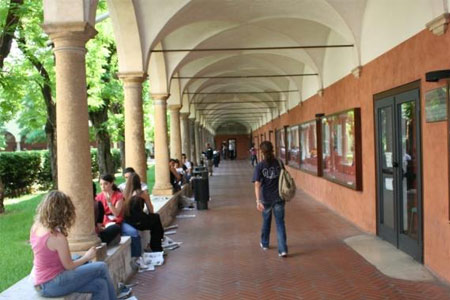- Didattica

Corsi di laurea
Corsi di laurea magistrale
POST LAUREA
- Facoltà
- Segreterie e sedi

Strutture
Segreterie
- Persone
- MY UNIVR
-
| Teaching is organised as follows: | ||||
| Unit | Credits | Academic sector | Period | Academic staff |
| PROSPETTIVA LONGITUDINALE DELLA RIABILITAZIONE DEI DISTURBI PERVASIVI DELLO SVILUPPO | 2 | MED/25-PSYCHIATRY | See the unit page | See the unit page |
| METODI E TECNICHE RIABILITATIVE NELL'ETA' DELLO SVILUPPO | 2 | MED/48-NURSING IN NEUROPSYCHIATRY AND REHABILITATION | TERP VR 3 ANNO - 1 SEMESTRE |
Giuseppe Lepore
|
| NEUROPSICHIATRIA INFANTILE | 2 | MED/39-CHILD NEUROPSYCHIATRY | TERP VR 3^ ANNO - 1^ SEMESTRE |
Alessandro Simonati
|
------------------------
MM: PROSPETTIVA LONGITUDINALE DELLA RIABILITAZIONE DEI DISTURBI PERVASIVI DELLO SVILUPPO
------------------------
------------------------ MM: PROSPETTIVA LONGITUDINALE DELLA RIABILITAZIONE DEI DISTURBI PERVASIVI DELLO SVILUPPO - MOD.A ------------------------ To provide the student in techniques of psychiatric rehabilitation with general elements that are necessary for the assessment, recognition, treatment and rehabilitation of persons with disabilities in their adulthood derived because of the sequelae of pervasive developmental disorders in childhood and adolescence when such persons pass under the purview of adult psychiatry ------------------------ MM: PROSPETTIVA LONGITUDINALE DELLA RIABILITAZIONE DEI DISTURBI PERVASIVI DELLO SVILUPPO - MOD.B ------------------------
------------------------
MM: METODI E TECNICHE RIABILITATIVE NELL'ETA' DELLO SVILUPPO
------------------------
The student during integrated learn to discern the characteristics of normal development, due to behaviors that characterize adolescence, atypical behaviors in which creep prodromal components of psychopathological symptoms. Learn the methods of intervention in case of onset of psychosis and assess the components that characterize the compilation of a Therapeutic Rehabilitation project. Also learn evaluating assistance with the administration of tests such as SAFE or VADO. The student will learn psychiatric rehabilitation techniques that are used in the various approaches to patients with various psychopathological decompensation conditions.
------------------------
MM: NEUROPSICHIATRIA INFANTILE
------------------------
Aims of the course are: A. to introduce students to the principles of neurodevelopment in childhood; B. to provide elements related to current methodologies necessary to neuro-psychological evaluation of children through their developmental steps, from early childhood to adolescence; C. To introduce students to clinical conditions with onset in childhood, requiring care and rehabilitation in adulthood. A. to introduce students to the principles of neurodevelopment in childhood. Principles of human neurodevelopment will be illustrated: issues on Central Nervous System Development as Biological Foundations of neuro-psychological development; the concept of the evolution from function to competence will be discussed, and the main trajectories associated with the maturation of human functions in childhood will be outlined; the processes of acquisition of motor, linguistic, cognitive, emotional competences will be discussed and commented with the students. B. to provide elements related to current methodologies necessary to neurodevelopmental neuro-psychological evaluation of children through their developmental steps, from early childhood to adolescence. Principles of Neurodevelopmental evaluations and related tools (Developmental Scale) and Neuropsychological assessment (concept of IQ, cognitive evaluation, adaptive behaviour and its measurement, behaviour rating scales) will be illustrated. C. To introduce students to clinical conditions with onset in childhood, requiring care and rehabilitation in adulthood. Clinical features, major diagnostic approaches, and principles of care and rehabilitation will be given of main Neurodevelopmental Disorders, such as Intellectual Disability, Autistic Spectrum Disorder, Attention Deficits (including the concept of ADHD), Gilles del Tourette syndrome, Psychopathological conditions of possible childhood onset (Anxiety Disorders, Depressive Disorders, Post-traumatic Stress Disorder, Psychopathology of Epilepsy).
------------------------
MM: PROSPETTIVA LONGITUDINALE DELLA RIABILITAZIONE DEI DISTURBI PERVASIVI DELLO SVILUPPO
------------------------
------------------------ MM: PROSPETTIVA LONGITUDINALE DELLA RIABILITAZIONE DEI DISTURBI PERVASIVI DELLO SVILUPPO - MOD.A ------------------------ Pervasive developmental disorders in adulthood: risk of misdiagnosis by the adult psychiatry officials; the characteristics of the evolution of pervasive developmental disorders of childhood and adolescence in adulthood; clinical examples. Presentation and discussion of a clinical cases of Asperger's syndrome in adulthood, which has a high probability of been misdiagnpsed; rehabilitation techniques in pervasive developmental disorders and autism spectrum disorders in particular. Implication for the organization of instituzional services ------------------------ MM: PROSPETTIVA LONGITUDINALE DELLA RIABILITAZIONE DEI DISTURBI PERVASIVI DELLO SVILUPPO - MOD.B ------------------------
------------------------
MM: METODI E TECNICHE RIABILITATIVE NELL'ETA' DELLO SVILUPPO
------------------------
Normal development. Characteristics of pathological development. Symptoms and signs of development pathological. Methodology of the interventions. of intervention on the patient and his family. Latency of mental illness. Evaluation of social and functional abilities of the subject with mental health problems. compilation of Therapeutic Rehabilitation Project. Information and identification of prodromal signs of a crisis. Mode of approach to patients in developmental age and his family. Evaluation of rehabilitation interventions. Topic: Vision of the film which tells the story of two teenagers hospitalized at a clinic for people with psychiatric disorders. Discussion on the story of the film and analyzes the dynamics. Evidence Based Rehabilitation techniques. Social Skills Training. Improve adherence to medication. Techniques for improving adherence to rehabilitative interventions. The family psychoeducation. The Problem Solving. The CASIG questionnaire. Decline of cognitive functions caused by the onset of psychiatric illness. Training of cognitive.Software functions for cognitive training. rehabilitative interventions depending on the psychiatric condition. Rules for the application of rehabilitative interventions in relation to the psychiatric disorder Identification of land resources. Land management to improve integration. psycho-social interventions to help support the patient who attends: the school, the university, workplace, cultural and sports associations. The school and university support.
------------------------
MM: NEUROPSICHIATRIA INFANTILE
------------------------
Development: Definition Development as a genetically determined; factors influencing developmental trajectories: intrinsic factors (e.g. CNS structures organization and connectivity) vs extrinsic factors (pre- and post-natal enviromental cues) 2. Development of CNS Structures as Biological Foundation of Neurological and Psychological functions; Role of the Environment -development of neuromuscular structures, of sensory organs, of CNS; -pre- and post-natal development of functions; -relationship between CNS development, functional activities and enviroment toward the competence maturation -the mature brain from functional standpoints: the cognitive brain, the social brain, the emotional brain 3. Timeline of Development and Onset of Functions: Pre-Natal period; Early Post-Natal period; Pre-School age (2nd and 3d year; kinder school age); School age; Puberty and Transition to Adolescence Definition of Function as compared to Competence: Movement, Cognition, Social Activities and Communication; Emotion and their recognition, Play abilities 4. Clinical and Neuropsychological Evaluation Qualitative Evaluation: neurological evaluation; single cognitive function assessment; behavioural evaluation; Quantitative Evaluation: Developmental Scales; IQ evaluation and cognition; adaptive behaviour evaluation 5. Specific Clinical Conditions: Intellectual Disability; Autistic Spectrum Disorder, Chronic Epilepsy; Post-traumatic Stress Disorder
------------------------
MM: PROSPETTIVA LONGITUDINALE DELLA RIABILITAZIONE DEI DISTURBI PERVASIVI DELLO SVILUPPO
------------------------
------------------------ MM: PROSPETTIVA LONGITUDINALE DELLA RIABILITAZIONE DEI DISTURBI PERVASIVI DELLO SVILUPPO - MOD.A ------------------------ Written examination ------------------------ MM: PROSPETTIVA LONGITUDINALE DELLA RIABILITAZIONE DEI DISTURBI PERVASIVI DELLO SVILUPPO - MOD.B ------------------------
------------------------
MM: METODI E TECNICHE RIABILITATIVE NELL'ETA' DELLO SVILUPPO
------------------------
The exam consists in compiling a report on the topics covered in the classroom to check understanding of the methods and intervention strategies to be implemented in contexts which relate to the subject of developmental approach.
------------------------
MM: NEUROPSICHIATRIA INFANTILE
------------------------
Open discussion with small groups of students of a critical commentary written by each group, after reading an assigned scientific article related to one of the main topic of the course.
| Reference books | |||||
| Author | Title | Publisher | Year | ISBN | Note |
| Fred R. Volkmar, Lisa A. Wiesner | L'autismo dalla prima infanzia all'età adulta (Edizione 1) | Erickson | 2014 | 9788859006985 | |
© 2002 - 2024
Verona University
Via dell'Artigliere 8, 37129 Verona |
P. I.V.A. 01541040232 |
C. FISCALE 93009870234